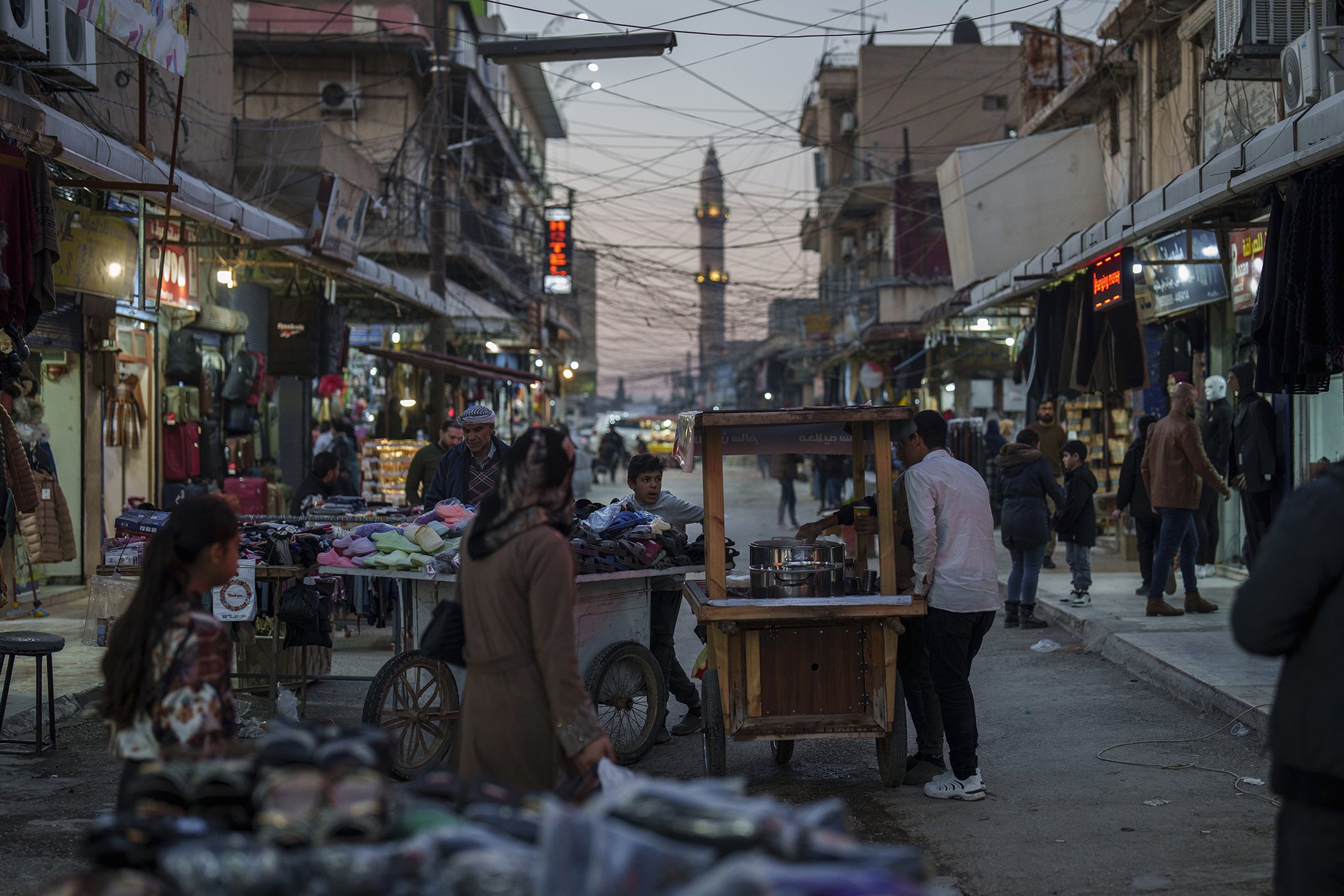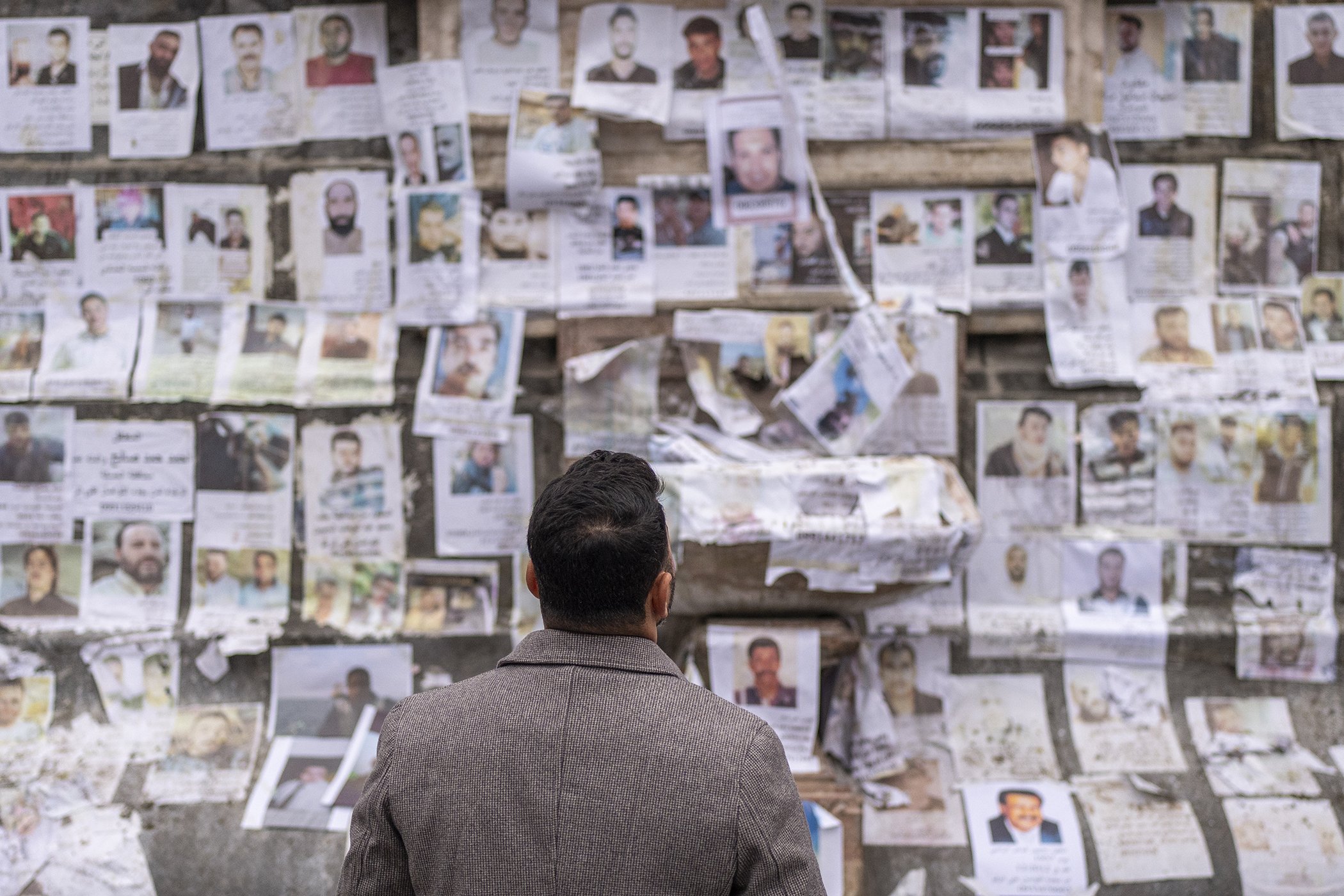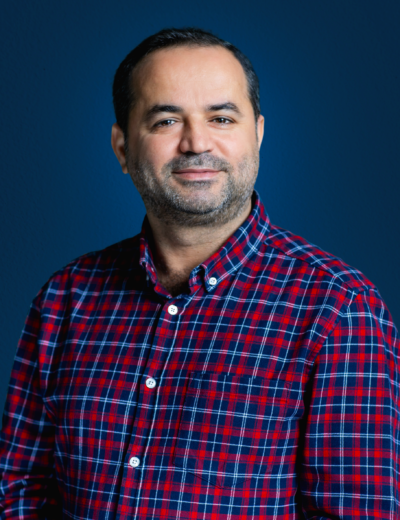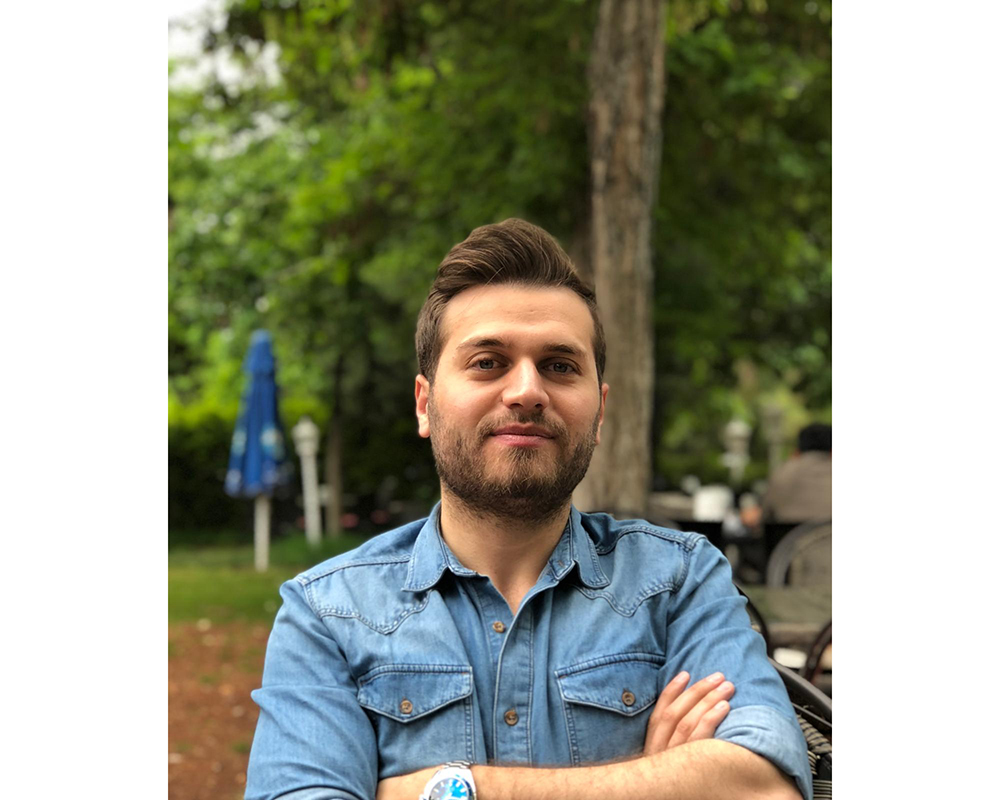In 2024 the Al-Assad regime of Syria fell after over 50 years in power,which human rights organisations welcomed. However, despite this significant change in the country, civic space in Syria remainsclosed, and among the concerns raised by civil society organizations isSyrian authorities being accused of arbitrary arrests and the detention of activists.
In a previously published Global Citizen In My Own Words article, human rights defender Bassam Alahmad detailed his experiences of being a stateless citizen residing in Syria who stands for justice. In this article, following the fall of Al-Assad, Bassam Alahmad is joined by colleagues fromSyrians For Truth and Justice, Simav Hasan, and Noah Abbas, as they share their reflections on what the regime change in the country means for them personally and for their hopes for a democratic Syria.
How would you describe your relationship with Syria and how has the decades-long conflict impacted you?
Bassam Alahmad: I think ‘complicated’ or ‘complex’ is the best way to describe my relationship with Syria. Being born stateless means having no rights, but we love our country because we were born there. We know the people and communities and we belong to the land but I didn’t feel as though I belonged politically. I didn’t feel as though I had full citizenship in the country. I like my country but unfortunately, the way in which the Kurdish people were treated for decades made it so we didn’t feel like we were equal parts of this country.
Noah Abbas: As a Kurdish Syrian national, the long-standing conflict in Syria has profoundly influenced both my personal and professional life. It has not only shaped my views on war and peace, but has also deepened my understanding of resilience and the value of community. Witnessing the enduring struggles of friends, family, and the broader Syrian community has motivated me to advocate for humanitarian causes and pursue solutions that aim to bring lasting peace to the region. The impact of this conflict extends into my academic pursuits as well; I am currently engaged in postgraduate studies in military intelligence and security.
This academic path was chosen with a clear purpose: to shift the perspective on the role of intelligence in Syria. Under Al-Assad's governance, intelligence agencies were often viewed as instruments of fear, particularly against opponents of the regime. As a human rights activist, I believe it is our duty to transform this perception and demonstrate how intelligence can serve as a cornerstone for justice and societal safety. Joining the efforts of Syrians for Truth and Justice has been crucial in my journey.
Simav Hasan: I am a Kurd from Qamishli, and so my existence here has always been shaped by layers of oppression, resistance, and hope. The decades-long conflict has left scars on my community and on me personally. I’ve witnessed forced displacement, the suffering of victims, and the destruction of lives and history. But more than that, I’ve felt the weight of injustice firsthand — whether through the fight for accountability, the struggle for basic rights, or the ongoing humanitarian crises. Despite everything, I refuse to detach myself from this reality. My work as a journalist and human rights activist is my way of pushing back against the violence, ensuring that the voices of the victims are heard, and trying to carve out a future where justice isn’t just a distant dream. The war has taken much, but it has also strengthened my resolve. Even in the darkest moments, I believe in the power of truth, memory, and resistance.
 People stroll through a local market in the northeastern Syrian city of Qamishli, which is controlled by the U.S.-backed, Kurdish-led Syrian Democratic Forces, Jan. 28, 2025.
People stroll through a local market in the northeastern Syrian city of Qamishli, which is controlled by the U.S.-backed, Kurdish-led Syrian Democratic Forces, Jan. 28, 2025.
How did the former Syrian regime affect your and other civic workers' work?
Alahmad: We all know how there was a huge dictatorship behind the last regime. It was not democratic. Civic society and human rights work were not welcomed. Dealing with the previous regime was like dealing with Iran, North Korea, or the previous Saddam Hussein regime.
Abbas: The previous regime’s impact was intense and multifaceted, primarily characterized by restricted access, widespread misinformation, brutal repressions, and severe risks including arrests and executions. Under Al-Assad, access to information and freedom to operate within the civic space were heavily limited. Authorities tightly controlled what information was released to the public, often disseminating misinformation to manipulate public perception and discredit civic movements. Moreover, those of us working within the civic space were constantly at risk of being targeted by state security forces.
The fear of arbitrary arrest, torture, and even execution was a daily reality for many activists and civil society workers. This created an atmosphere of fear and intimidation, severely limiting the capacity for effective advocacy and engagement. The tight constraints on the civic space also meant that operating openly could lead to severe consequences, forcing many activists and organizations to work in secrecy or from exile. This limitation not only impacted collaboration and resource-sharing but also hindered the overall effectiveness of documentation and tracing violations against civilians.
Hasan: The civic space and its actors have been under constant attack by the Syrian regime since the first days of the uprising [in 2011]. I had to keep a low profile and take extensive safety precautions to continue my work. But over the past 14 years, repression has not come from just one perpetrator. As the war evolved, new forces emerged, each bringing its own restrictions and threats. ISIS was only a few kilometers away from my hometown, posing an existential danger to anyone working in journalism or human rights. Meanwhile, the Turkish-backed Syrian National Army controlled neighboring areas, limiting my movement and creating further risks. Navigating this landscape meant constantly adapting to shifting frontlines, unpredictable security conditions, and relentless surveillance. Throughout these years, I have continuously covered multiple crises — forced displacement, missing persons, water shortages, and countless human rights violations. The challenges have been immense, but so is the responsibility to document and amplify the voices of those affected.
In 2024 the Al-Assad government fell, how did this make you feel?
Alahmad: To be honest, while part of me is very happy that there is no longer the Assad regime, part of me also thinks that there is a big obstacle in the road to democracy, open civic society, and citizenship. As people working in human rights we must not be naive because we know the history and we know that there are human rights violations committed. The main issue is there is a huge gap betweenwhat they say to the west — to the EU, to the US, to the UN — and what they ultimately decide. For example, the national dialogue was kind of a missed opportunity, where instead of having a good version of national dialogue in Damascus and to be more inclusive, they excluded a huge part of Syria, including Kurds and other minorities.
It was a missed opportunity. The same is true with the constitutional declaration adopted in March 2025. They didn't recognize the Kurdish people or the Kurdish language. They did not recognize diversity. Most of the authority was in the hands of the president. Our main problem is that Syria without the Assad regime is good, but there is no guarantee that we are going towards democracy. The recent Human Rights Watch report on the constitutional declaration clearly states that this constitutional declaration is not a road to a democratic country. This should be very clear for our partners in the US, the EU, and the international community. The most serious thing that happened in the coastal area in Latakia and Tartus is that hundreds of Alawite people were killed based on their identity, because they are from this minority group. A lot of violations happened by the groups linked to the government.
Abbas: The fall of the Al-Assad government, as welcomed by human rights organizations, provoked a complex mix of emotions within me. On one hand, I felt a profound sense of relief and happiness that the brutal regime, known for its relentless human rights violations and oppressive rule, had come to an end. The release of prisoners of conscience and the acknowledgment of the sacrifices made by countless human rights defenders brought a wave of hope for a future where justice and accountability could finally be addressed. However, as a Kurdish-Syrian national, this transition also brought with it significant fears and concerns. The potential for ethnic conflicts or even ethnic cleansing within the new power structures (such as the factions that committed violations in Efrin city, my home town, and other Kurdish cities across the country) was alarming, especially given the historical challenges faced by Kurdish communities in asserting their rights and safety within Syria.
Despite these fears, the fall of the regime marked a critical moment for Syria — an opportunity to rebuild and redefine the nation on the principles of freedom, justice, and human dignity. It was a moment to champion the efforts of Syrians for Truth and Justice and engage more actively in the civil society space dedicated to transitional justice and documenting human rights violations.
Hasan: With the fall of the Assad government, I felt a sense of cautious optimism. It marked the end of a regime responsible for decades of repression, war crimes, and mass atrocities — a moment many victims and survivors had long awaited. There was hope that this could be the beginning of rebuilding Syria on principles of justice, accountability, and human rights. However, I remained wary. The fall of a regime does not automatically guarantee freedom or stability. Power vacuums in Syria have often led to new forms of repression and external interference. Many armed actors still operate with impunity, and the path to true justice remains uncertain. While this moment was significant, real change depended on what came next. Would justice be pursued? Would the voices of victims and marginalized communities — especially Kurds and other oppressed groups — be heard? The fall of Assad was a turning point, but Syria’s future was still being written.
In your opinion, what do you think needs to happen to open up Syria’s still-closed civic space after the regime change?
 A man looks at portraits of missing people whose families say they were taken by the Assad regime are plastered across a monument in Damascus, Syria, Dec. 28, 2024.
A man looks at portraits of missing people whose families say they were taken by the Assad regime are plastered across a monument in Damascus, Syria, Dec. 28, 2024.
Alahmad: Unfortunately, I don't yet see that the civic space in Syria is open. But also to be fair, the current space is bigger than the space under the previous regime. What we need is to make this space wider and bigger and to protect this space. This is why we need the support of the UN, the EU, and by governments who believe in democracy. We also need civil society. This space should also be legalized. We need a modern registration law for NGOs in Syria. We also need the government to not only protect the organisations that come from an Islamic background or that are close to the government, the government should allow all people, in every organisation, all Syrian organisations to work freely in Syria. For this we need the support of the international community to keep pressure on this government and to observe their steps in order to push them to really become a democratic country and not create another dictatorship.
Abbas: To effectively open Syria’s civic space post-regime change, it is essential to enhance the presence and access of established international mechanisms like the Independent International Commission of Inquiry and the Independent Institution for Missing Persons in Syria. These bodies, pivotal in documenting human rights abuses and upholding justice, should be granted unrestricted access across the country. Concurrently, Syria needs comprehensive legal reforms that protect civil liberties, along with security sector reform to align with human rights standards — strengthening the relationship between the government and civil society.
Hasan: Despite the fall of the Assad regime, Syria’s civic space remains closed due to ongoing conflicts, foreign interference, and the power struggles of various armed groups. Removing a dictator is not enough; real change requires a fundamental shift in governance, security, and justice. For Syrian civic space to open, freedom of expression and assembly must be guaranteed so that activists, journalists, and civil society organisations can operate without fear. Laws that criminalize dissent need to be abolished, and independent media must be protected. Impunity must end, with all those responsible for war crimes and human rights violations — whether from the former regime, opposition groups, or foreign-backed militias — held accountable.
A genuine transitional justice process is essential to rebuilding trust and ensuring that victims’ voices are heard. The militarisation of Syria and foreign interference continue to restrict civic engagement, making it critical to establish a political process that prioritizes Syrian voices over external agendas. Civil society, which has survived under extreme conditions, must be strengthened through legal protections and institutional support, allowing it to play a central role in shaping the country’s future rather than being sidelined by political and military actors. A meaningful transition must center the victims and marginalized communities, including Kurds, forcibly displaced people, and families of the missing. The only path to a truly open civic space is through an inclusive, rights-based process — one that does not simply replace one form of repression with another but instead lays the foundation for lasting justice and genuine democratic participation.
What is your hope for Syria?
Alahmad: What I hope for Syria is what I wish for all people around the world, and I can only describe that as a normal country. But I think that’s not enough. I think now we should be very clear that what we wish or hope for Syria is a real democratic and inclusive Syria with strong democratic institutions. This is very important. It's not just about nice words. We hear nice words in the media about diversity. We need the rights of all Syrian people, and diversity protected in the constitution. We need the constitution to say Arabs, Kurds, and other people are equal. We need the constitution to say that Kurds have the right to speak in their own language. We need to give equal, clear rights to women. We need all human rights.
We also need the separation of powers. It's not about nice words now, it's about putting the good things in the constitution. We also need to have an inclusive national transitional justice in which all people are represented. We don’t have it yet. We also need inclusive accountability and inclusive reparations and other elements of transitional justice. Without that, I don't think we will be a democratic country. And unfortunately, if there is no real democratic transition, I think we'll be repeating the same mistakes that have already happened in Syria.
Abbas: My hope for Syria is a future where all community components have their rights respected and enshrined in a durable constitution that guarantees civil and human rights, including freedom of speech. It is essential to build trust between the government and the public, which is fundamental for applying transitional justice effectively, thereby restoring the rights of those who were suppressed. An integral part of this hope is ensuring the safe return of internally displaced people, including the displaced people from Efrin, Sere-Kanyieh (Ras Al-Ain), and Geri Sepi (Tal Abiyad), to their homes in a secure and dignified manner.
Additionally, resolving the Kurdish issue in a way that grants them full rights and integration into the political and social fabric of the country is crucial. I also hope for a strengthened civil society where civil rights movements can operate freely, along with reformed security and military bodies that prioritize the safety and well-being of the Syrian people above all else. The path forward involves addressing and overcoming complex fears. Our collective efforts as civil society hope and aim to ensure that all Syrians, regardless of ethnicity or background, can live in a future filled with peace and security.
Hasan: My hope for a new Syria is a country built on justice, dignity, and true inclusivity — a Syria where every person, regardless of their background, can live freely without fear of repression or displacement. I dream of a Syria where victims are at the center of the transition, where those who have suffered the most — families of the missing, the displaced, and marginalized communities like the Kurds — are not just heard but actively shape the future. I want to see a Syria where accountability replaces impunity, where those responsible for war crimes and human rights violations face justice, no matter their political or military affiliation. A country where civil society thrives, free from intimidation, and where journalism and activism are respected rather than silenced.
This article, as narrated to Gugulethu Mhlungu, has been slightly edited for clarity.
The 2024-2025 In My Own Words series is part of Global Citizen’s grant-funded content.


